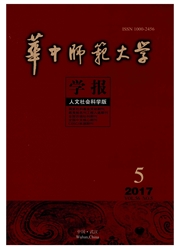

 中文摘要:
中文摘要:
生计资本转换是生计可持续的内在动因,生计资本转换行动嵌入区域交换系统中,受结构因素约束.当农户通过生计资本转换不能应对频繁的生计风险并从生计风险打击中恢复,或者生计资本转换效率长期维持在较低的均衡水平,农户生计便呈现较强脆弱性.在微观层面,生计脆弱是武陵山区贫困的内在致因,体现为生计风险频发、农户生计资本匮乏、农户生计资本转换能力薄弱等内在关联.在宏观层面,区域交换系统“交换层面”分离导致了区域脆弱,抑制生计资本转换.公共产品供给是武陵山区扶贫开发的核心路径,在延续并增强当前基础性与生产性公共产品供给的同时,应通过构建资产社会政策、发展避灾农业、重构乡村社区社会公共性,有针对性地缓解农户生计脆弱.
 英文摘要:
英文摘要:
Livelihood capital conversion is the intrinsic motivation and mechanism of sustainable livelihood. The actions of the conversion embed into regional exchange system, and are influenced by structural factors. When farmers could not cope with frequent livelihood risks and recover from the shock of livelihood risks by means of livelihood capital conversion, or the conversion efficiency maintain in a low equilibrium level for a long time, farmers would fall into high livelihood vulnerability. At the micro- level, high level of livelihood vulnerability is the core intrinsic cause of poverty in Wuling mountainous areas, which is embodied as frequent appearance of livelihood risks, lack of livelihood capital, and weak livelihood capital conversion capacity. At the macro-level, there are different “exchange levels” in regional exchange system. The separation of different exchange levels leads to regional vulnerability, and inhibits the conversion of livelihood capital. The supply of public goods is the core path to alleviate poverty in Wuling mountainous areas. To efficiently relieve vulnerability of farmers' livelihoods, it needs to establish assets policies, develop avoiding calamity agriculture, and reconstruct publicity of rural communities.
 同期刊论文项目
同期刊论文项目
 同项目期刊论文
同项目期刊论文
 期刊信息
期刊信息
